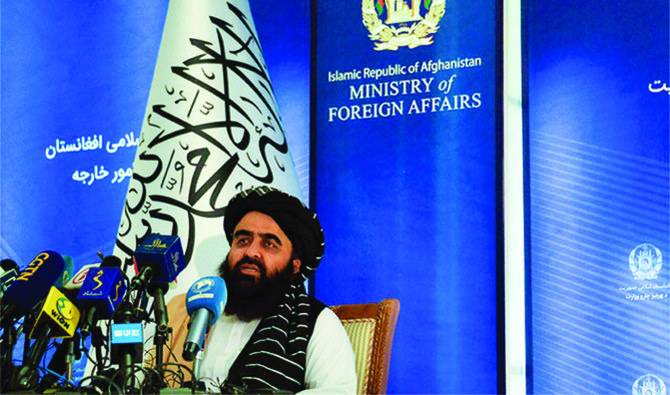ISLAMABAD: Afghanistan’s interim Foreign Minister Amir Khan Muttaqi is scheduled to visit Pakistan on Wednesday to discuss bilateral ties, trade and economic cooperation, the Afghan Foreign Ministry said on Tuesday.
This will be the first visit of a senior Afghan official to Pakistan since the Taliban seized control on Aug. 15.
Pakistan’s Foreign Minister Shah Mahmood Qureshi visited Kabul last month, announcing that a Taliban delegation would soon visit his country to address bilateral issues and further strengthen relations between the two sides.
“A senior delegation led by FM Mawlawi Amir Khan Muttaqi will travel to Pakistan on Nov 10,” the Afghan Foreign Ministry spokesperson, Abdul Qahar Balkhi, said in a Twitter post on Tuesday. “Delegation will discuss enhancing ties, economy, transit, refugees & expanding facilities for movement of people, & will include Ministers & working groups from Finance & Trade Ministries.”
While Islamabad has not formally recognized the Taliban as Afghanistan’s legitimate rulers, it is among a handful of countries that have retained their diplomatic presence in Kabul. Confirming the visit, Pakistan’s Ambassador to Kabul Mansoor Ahmed Khan called it extremely significant, noting that the visit comes at a time when Afghanistan is facing several economic and humanitarian issues.
“Pakistan and Afghanistan are close neighbors who cherish an important relationship which is rooted in common border, history, culture and religion,” he told Arab News.
“It is an important visit in the current scenario when Afghanistan faces serious economic issues that can lead to a major humanitarian disaster,” he continued.
Khan said Pakistan’s foreign minister had led a high-level delegation to Kabul on Oct. 21 to figure out how his country could meaningfully assist Afghanistan.
“At that occasion, we also invited the Afghan side to visit Islamabad to discuss bilateral contacts by focusing on humanitarian engagement, trade, transit and people-to-people movement between the two countries,” the Pakistani envoy said.
Salman Bashir, a former Pakistani foreign secretary, told Arab News that the visit of the Afghan foreign minister reflected a deepening engagement between the two countries.
“The Afghan side is also trying to mobilize regional efforts for its socioeconomic development,” he said, adding that the world needed to recognize that the Taliban had emerged as a dominant force and established their government in Afghanistan.
“Pakistan has dealt with everyone who established a government in Kabul in the past and will establish formal relations with this government as well,” he noted.
“In a way, Pakistan has already recognized them (unofficially) as we have an ambassador in Kabul who meets the Taliban officials,” Bashir continued. “Their foreign minister is going to be visiting us not as a member of the Taliban movement but as a senior official of his country.”
Rustam Shah Mohmand, an Afghan affairs expert who also served as Pakistan’s envoy to Kabul, said the visit of the Afghan official could pave the way to the formal recognition of the Taliban government by Pakistan.
“Pakistan has no other option than to recognize the Taliban government,” he said. “They may do it after a few months but eventually that is the only option.”
Mohmand said that the postponement of Pakistan’s decision over the issue was providing other countries with an “excuse” and creating distrust between Islamabad and Kabul.
“Other countries present it as an excuse that a neighbor (of Afghanistan) with over two million Afghan refugees has not recognized the Taliban government,” he said. “It provides them with a justification of why they should not do it either.”
Mohmand added that visa issues, border management and trade concerns were also likely to be discussed during the meeting.

